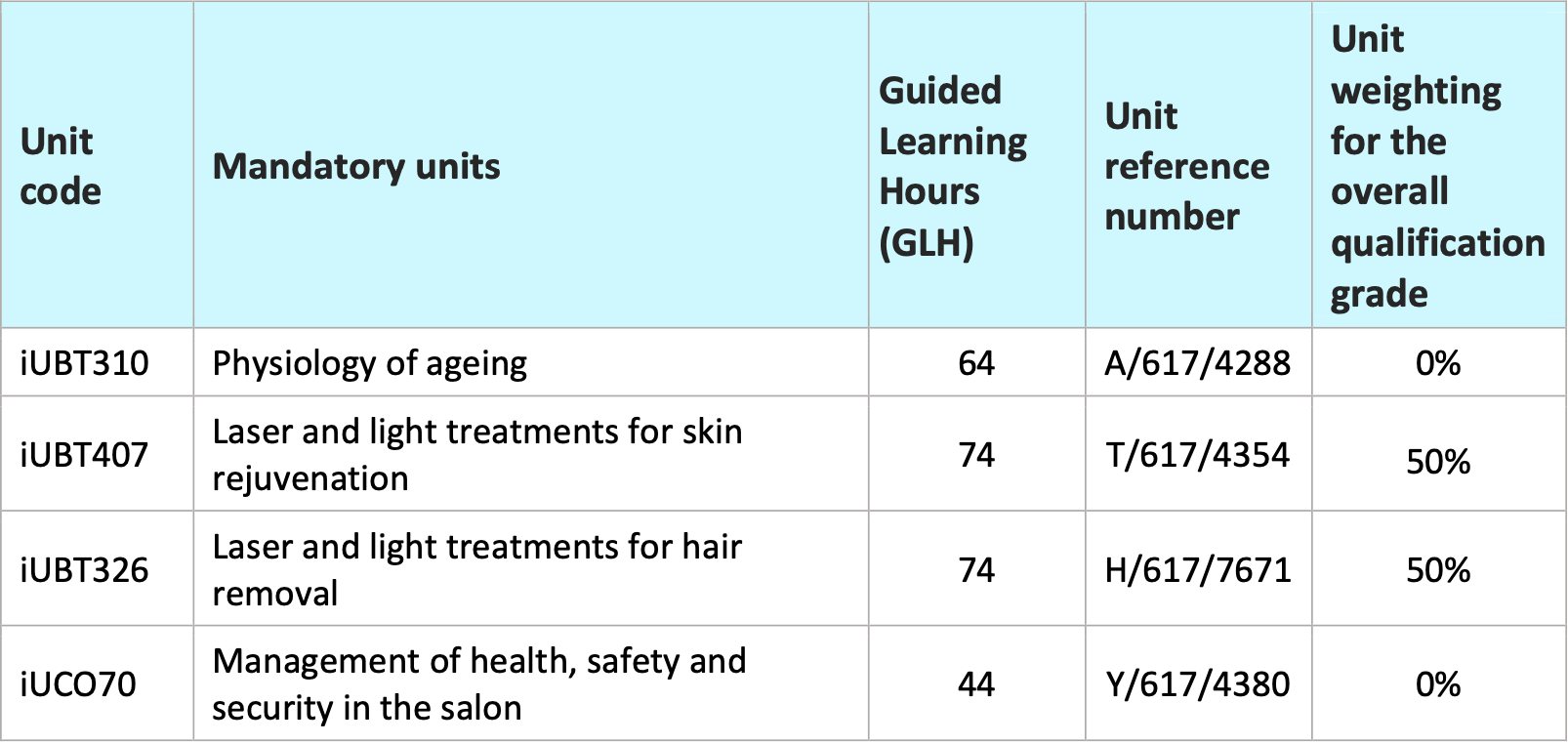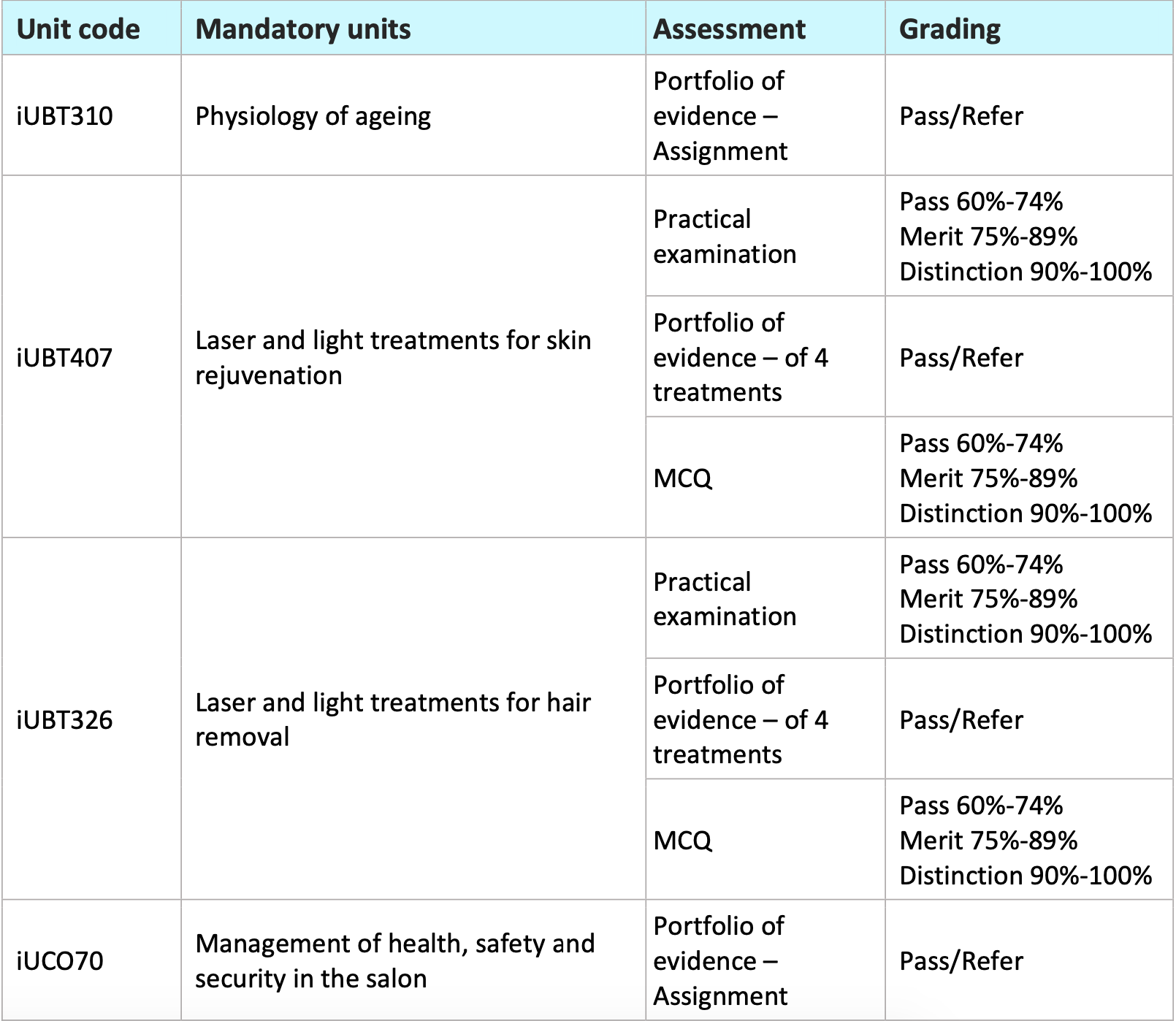Diploma in Laser and Light Treatments
Courses
Level 4 (RQF) NQF IE Level 6
Cost: €2,500
1/2 day per week for 16 weeks
Timetable: 09:30 - 12:30 Wednesday's
Aims and Objectives
The main aim of the VTCT (ITEC) Level 4 Diploma in Laser and Light Treatments is to enable learners to gain the necessary practical and theoretical skills in order to provide laser and light treatments to the general public and to gain employment in the beauty industry. This qualification is suitable for learners aged 18 and over and is designed to provide occupational competence at level 4. It also provides a sound platform into further training at levels 3 and 4.
The main skills the learner will perform are: Laser and light treatments for hair removal – to include consultation, skin and hair analysis, recognising contra-indications and contra-actions, carrying out relevant tests prior to treatment and adapting the treatment to the client’s needs Laser and light treatments for skin rejuvenation – to include consultation, skin analysis (Fitzpatrick scale), recognising contra-indications and contra-actions, carrying out relevant tests prior to treatment and adapting the treatment to the client’s needs. Managing health, safety and security in the salon. The learner will also learn about client care and communication and the physiology of ageing which is essential in order to work and be successful in the industry.
Content
This qualification is for learners who want to work within the beauty industry. The qualification consists of 4 mandatory units with a total of 256 hours of Guided Learning (GL) to achieve the full qualification.
The main skills the learner will perform are:
- Laser and light treatments for hair removal–to include consultation, skin and hair analysis, recognising contra-indications and contra-actions, carrying out relevant tests prior to treatment and adapting the treatment to the client’s needs
- Laser and light treatments for skin rejuvenation–to include consultation, skin analysis (Fitzpatrick scale), recognising contra-indications and contra-actions, carrying out relevant tests prior to treatment and adapting the treatment to the client’s needs
-
Managing health, safety and security in the salon
The learner will also learn about client care and communication and the physiology of ageing whichis essential in order to work and be successful in the industry. It also provides:
- The related knowledge and understanding required to perform the treatments listed above effectively, in particular anatomy and physiology and common diseases and disorders that may affect when a client should or should not receive treatment
- Opportunities for learners to focus on the development of their wider skills in a laser and light setting, such as communicating with clients, working with others and problem solving
- Opportunities for learners to develop a range of skills, techniques, personal qualities and attitudes essential for successful performance in employment as a laser and light technician
Opportunities for progression
- Once learners have achieved the VTCT (ITEC) Level 4 Diploma in Laser and Light Treatments they may progress on to other VTCT (ITEC) or equivalent qualifications at level 4 for example:
-
- Level 4 Award in Laser and Light Treatment for Hair Removal
- Level 4 Diploma in Advanced Skincare
- Level 4 Diploma in Spa and Salon Management
- Level 4 Certificate in Radio Frequency
- Level 4 Certificate in Skin Needling
- Level 4 Certificate in Skin Peeling
- Level 4 Certificate in Ultrasound
Opportunities for employment
There are opportunities for advanced skincare therapist to find employment in a variety of areas:
- Beauty salons
- Hotels
- Health clubs
- Spas
- Own business
Qualification structure
To be awarded the VTCT (ITEC) Level 4 Diploma in Laser and Light Treatments, learners must achieve all mandatory units.
The minimum GLH required to achieve this qualification is 256 The minimum TQT required to achieve this qualification is 380

Assessment
All treatment evidence, assignments, internal assessments, and underpinning knowledge must be completed prior to the final practical examination.
The final external practical examination will be carried out by the external examiner at the end of the period of learning. The external examiner will also verify a sample of the treatment evidence, assignments and internal assessment.


